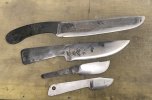- Joined
- Mar 16, 2015
- Messages
- 1,862
I have been obsessed with knives since I was a young child. It is no exaggeration to say that I find myself thinking about the ins and outs of knife design all throughout the day, no matter what I’m doing. It’s a constant song playing in the background of my life. My dream of knifemaking has become more obtainable in the past year, but still a ways off until I have the extra income and time to learn.
Well, today I got a call and found out that I received the new scholarship to take the beginner knife making course at the Bill Moran School of Bladesmithing!
I know that I am fortunate to even have a program like this close by, and I really think it will benefit my learning as I am the kind of person who needs to see demonstrations firsthand to really grasp the concept.
I am beyond excited, and I know that the instructors are top notch, but I wanted to ask a few questions so that I can be sure to get the absolute most value out of the experience!
1.) What, as a knife maker, would you recommend to really pay the closest attention to? I’m other words, what is the thing that you wished you could have had a better understanding of when you first started?
2.) Would it benefit my beginner learning more to approach this as a “what to do” process or more of a deeper “why am I doing this”? In other words, should I just try to focus on the fundamental process, or should I try to nail down the exact “why” that I’m doing what I’m doing.
3.) Finally, what advice would you experienced makers give to yourself if you were starting out all over again?
Thanks for taking the time to read this, my family knows that I am excited, but I’m not sure if they fully understand the desire to learn this art, I’m glad to have a place where people get it!
Well, today I got a call and found out that I received the new scholarship to take the beginner knife making course at the Bill Moran School of Bladesmithing!
I know that I am fortunate to even have a program like this close by, and I really think it will benefit my learning as I am the kind of person who needs to see demonstrations firsthand to really grasp the concept.
I am beyond excited, and I know that the instructors are top notch, but I wanted to ask a few questions so that I can be sure to get the absolute most value out of the experience!
1.) What, as a knife maker, would you recommend to really pay the closest attention to? I’m other words, what is the thing that you wished you could have had a better understanding of when you first started?
2.) Would it benefit my beginner learning more to approach this as a “what to do” process or more of a deeper “why am I doing this”? In other words, should I just try to focus on the fundamental process, or should I try to nail down the exact “why” that I’m doing what I’m doing.
3.) Finally, what advice would you experienced makers give to yourself if you were starting out all over again?
Thanks for taking the time to read this, my family knows that I am excited, but I’m not sure if they fully understand the desire to learn this art, I’m glad to have a place where people get it!

